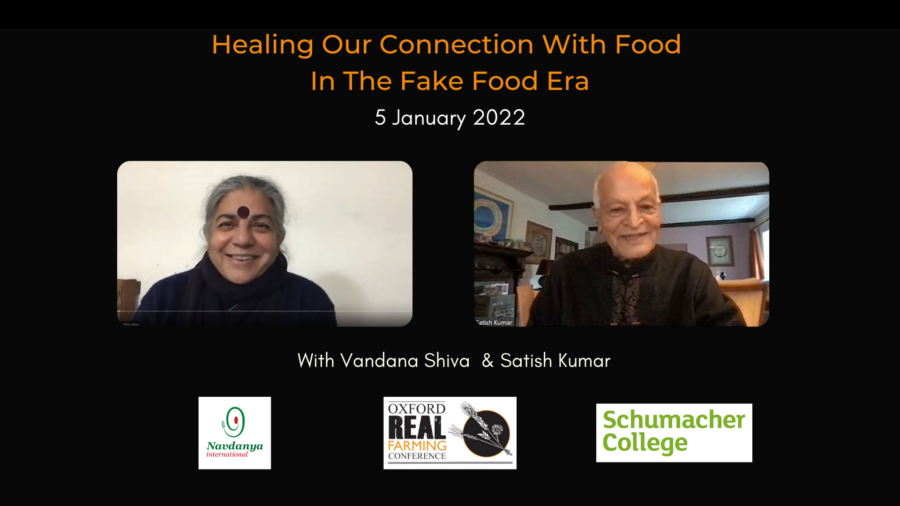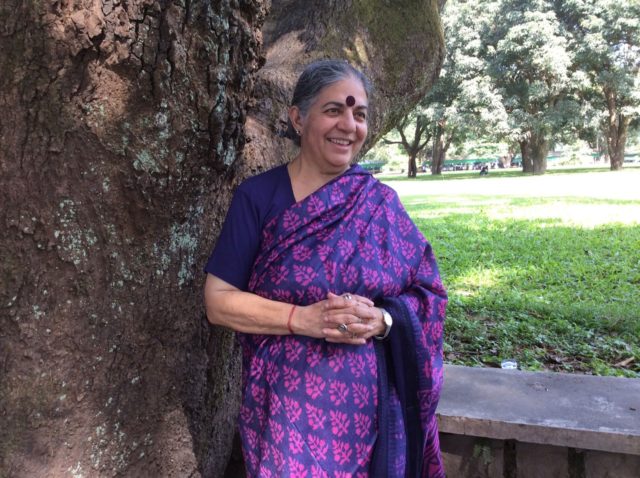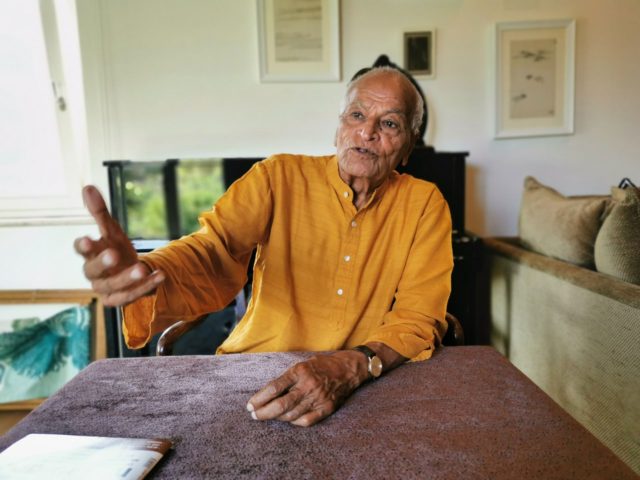
Lifegate, 28 January 2022 | Source
The same tycoons who created factory farms are the ones investing in fake meat. But “real” food can’t be created in laboratories: regenerative agriculture is the only way.
On January 5, 2022, Navdanya International participated in the annual Oxford Real Farming Conference with a session titled “Healing Our Connection With Food In The Fake Food Era”, with Dr. Vandana Shiva, founder of Navdanya and the Research Foundation for Science, Technology and Ecology (India) and President of Navdanya International, and Satish Kumar, Editor Emeritus of Resurgence & The Ecologist, and co-founder of the Schumacher College. The speakers discussed how we must re-establish our connection with eating as an ecological act in defiance of the false solutions that shift political power away from regenerative farmers and local communities.

Vandana Shiva, scientist, ecologist, activist and author © Manlio Masucci-Navdanya International
Fake food is not the solution
“Fake food is essentially repeating the old failed narrative that industrial agriculture feeds the world”. Vandana Shiva stressed. Real, nutrient rich food is disappearing, and the dominant farming model is exacerbating climate change and leading to an increase in chronic disease epidemics. Yet, in reality, it is the small farmers that feed us and therefore real food comes from biodiverse farms that embrace a regenerative farming model of care. Creating a farming system devoid of animals is not the answer because it represents a form of violence that condemns them to the danger of extermination. Instead of writing off animals altogether, it is important to understand the difference between both systems: whereas small scale farmers integrate animals as vital diversity in a functional agro-ecosystem and do not torture and overpopulate their fields with them, factory farms feature huge numbers crammed in deplorable conditions while emitting GHG emissions.
“The current agricultural system does not provide dignity for the farmers” said Satish Kumar. Through his Schumacher college, he tried to reverse the notion that if you are educated, you do not need to work on the land. According to him every school should have a garden, every university should be associated with a farm and young people should recognize the value of growing food to have a holistic, ecocentric education. In October, Kumar spoke at the Vatican and suggested a perspective on the problem of climate change and the ecological crisis we face today, from a Jain point of view. The idea is that, first of all, we should do no harm. That is the Hippocratic Oath that medical doctors take, which is a commitment to non violence. In his view, we all should take the same oath and commit ourselves to causing no harm to nature, animals, land, forests, and people. Non violence should thus be the guiding spirit in our relationship with food.
«Healing Our Connection with Food in the Fake Food Era» – Our event at @ORFC with @drvandanashiva @NavdanyaBija and #SatishKumar @SchumacherColl @Resurgence_mag #foodsystem4people #Food4Health
https://t.co/4rgy9ibzFk— Navdanya International (@NavdanyaInt) January 14, 2022
Eating is an ecological act
According to Vandana Shiva, the ecological movement of today can learn from the perseverance and solidarity exhibited in the Indian farmers’ protests. To be transformative, it needs to promote a kind of farming that supports the Earth through true ecological processes that support people’s health and that of the Planet. “Our movement – said Vandana Shiva – has to be founded on the awareness that eating is an ecological act, and join hands with the Earth, and with the farmer as one unity. Therefore, the pattern of big farms with big money, and big investors wanting to extract more from the earth, needs to be reverted in favor of a return to a culture of care that provides dignity to farmers who produce real food to feed the world”.

Satish Kumar, activist, ecologist and author © Manlio Masucci-Navdanya International
Satish Kumar expressed how the world has created a uniformity that tends to invalidate local conditions and knowledge elsewhere. Because of this mindset we are gradually losing the diversity of seeds, foods and plants. As a result, we are eating fewer products and replacing them with increasingly synthetic ones like fake food. Instead, we need to embrace this diversity that defines our Planet and its cultures, because diversity and unity are inseparable. Reflecting on how we can create more holistic solutions in the food system, Kumar urged people who want to contribute to change to think that even a huge river starts from many little springs. We must therefore be the spring, and start wherever we are, however we can, because even the smallest idea can be transformative.
Food is not a commodity
Vandana Shiva ended the discussion with a plea for plant-based diet advocates: “It is possible and healthy to have a whole and nutritious diet based on biodiverse plants. But do not become subscribers to Mr. Bill Gates’ fake food empire. Please do not serve a bigger evil just because you want to avoid animal products. The same Tycoons who created the factory farms are the ones who are investing in fake meat, so don’t see these as alternatives because they are both sources of profit for the same actors”.
This event showed us that the solutions to our global crises already exist. They come from building cultures of interconnection and regeneration and of healing our relationships to food, nature, and community. Food is not a commodity, it is not stuff put together artificially in labs. Food holds the contributions of all beings that make the food web. We need to become aware of these connections and actively work to rejuvenate and regenerate the Planet by participating in reciprocal ecological processes and restoring biodiversity. For this to happen, eating must thus return to being an ecological act, so that the false solutions of fake foods – which do nothing to challenge the profit-oriented food industry – will not create further disconnections and crises.
Longer version
Webinar: Healing Our Connection With Food In The Fake Food Era – Highlights
On January 5, 2022, Navdanya International participated in the annual Oxford Real Farming Conference with a session titled “Healing Our Connection With Food In The Fake Food Era”, with Dr. Vandana Shiva, founder of Navdanya and the Research Foundation for Science, Technology and Ecology (India) and President of Navdanya International, and Satish Kumar, Editor Emeritus of Resurgence & The Ecologist, and co-founder of the Schumacher College. The conversation was moderated by Ruchi Shroff, Executive Director of Navdanya International. The speakers discussed how we must re-establish our connection with eating as an ecological act in defiance of the false solutions that shift political power away from regenerative farmers and local communities.
Ruchi Shroff introduced the discussion by explaining how we now live in an era where our connection with food and with the communities that grow it has been lost. How we produce, distribute, and consume food is thus increasingly becoming the centre of the multiple crises we face today. Whether it is ecological crises of biodiversity decline, climate change or the health crisis of hunger, malnutrition and the spate of diseases like cancer linked to pesticides and toxic substances in our environment and food chain, the root of the problem is a growing dependence on a dysfunctional paradigm based on pesticides and monocultures, and a separation between humans and nature.
But in response to the crises of our food system we are seeing the rise of techno fixes such as fake food alternatives which claim to be real solutions. Fake foods look to replace animal products, and other staple food products with highly processed or lab grown alternatives using techniques such as synthetic biology to create new ingredients not found in nature, lab-cultures or through implanting new genes through artificial transgenesis and gene editing. These reductionist solutions negate the essential symbiotic relationships between humans, plants, animals and microorganisms and, in the same vein, also deny their potential for maintaining and regenerating the web of life.
Dr Vandana Shiva began the discussion by stressing how fake food is essentially repeating the old failed narrative that it is needed in order to “feed the world”. A narrative that has always been advanced by the industrial farming model. Real, nutrient rich food is disappearing, and the dominant energy intensive farming model based on artificial fertilisers and heavy processing is creating more entropy, exacerbating climate change and leading to an exponential growth in chronic disease epidemics. However, as research shows, industrial farming does not feed the world, rather it is the earth, the small farmers and the pollinators that feed us and therefore real food comes from biodiverse farms that embrace a regenerative farming model of care.
She continued by pointing out that there has been a deliberate confusion created between factory farms based on exploitation, and animals on small ecological farms which are an essential part of an integrated system. As a consequence, animals are often seen as the main problem of modern food systems, with many arguing in favour of discarding them. But, creating a farming system devoid of animals also represents a form of violence that condemns them to the danger of extermination. Instead of writing off animals altogether, it is important to understand the difference between both systems: Whereas small scale farmers integrate animals as vital diversity in a functional agro-ecosystem and do not torture and overpopulate their fields with them, factory farms feature huge numbers crammed in deplorable conditions while emitting GHG emissions and relying on huge public subsidies. Non violence should thus be the guiding spirit in our relationship with food.
‘We must understand the diversity of this planet🌍🌱. Diversity and decentralisation is the way the earth and cultures of the earth works. Stop listening to the propaganda and start looking with our eyes 👀 at the farm next door’ – the inspirational @drvandanashiva at @ORFC. pic.twitter.com/HP1oDQzsmW
— Jenny Briggs (@JennyMBriggs) January 5, 2022
Dr Shiva then turned her attention to the farmers’ protests in India, praising the commitment that saw farmers sitting through the cold, heat, rain and violence over a period of 14 months to fight three laws that would have completely destroyed small farmers’ rights in India. According to her, the ecological movement of today can learn from the perseverance and solidarity exhibited in the Indian farmers’ protest. To be transformative, the ecological movement of today has to promote a kind of farming that supports the earth through true ecological processes that – in turn – support people’s health and that of the planet. Our movement right now has to be founded on the awareness that eating is an ecological act, eating is a spiritual act, and we have to join hands with the earth, and with the farmer as one unity. Therefore, the pattern of big farms with big money, and big investors wanting to extract more from the earth, needs to be reverted in favour of a return to a culture of care. Events like the Indian protests represent an example of how farmers can play a dignified role in caring for the earth and producing real food to feed the world.
She then ended her discussion with a plea for plant-based diet advocates: “It is possible and healthy to have a whole and nutritious diet based on biodiverse plants. But do not become subscribers to Mr. Bill Gates’ fake food empire. Please do not serve a bigger evil just because you want to avoid animal products. The same Tycoons who created the factory farms are the ones who are financing and investing in fake meat, so don’t see these as alternatives because they are both sources of profit for the same actors”.
Satish Kumar began by talking about the Schumacher College, which he established in order to introduce organic farming as part of education. For him, the problem is that there is no dignity in our modern agricultural system, both for the farmers and the workers. Indeed, the prejudice still prevails that if you are educated, you do not need to work on the land. So, through his college, he has tried to reverse this notion. According to him every school should have a garden, every university should be associated with a farm and young people should respect and recognize the value and the importance of growing food, while also learning about other more traditional subjects to have a holistic, ecocentric education.
He also talked about his experience speaking at the Vatican in the presence of Pope Francis last October. There he suggested a perspective on the problem of climate change and the ecological crisis we face today, from a Jain point of view. The idea is that, first of all, we should do no harm. That is the Hippocratic Oath that medical doctors take, which is a commitment to non violence. According to him, we all should take the same oath and commit ourselves to causing no harm to nature, animals, land, forests, and people.
Moreover, in agreement with Dr. Shiva, he also expressed the need to remember the basic principle that uniformity is not unity. The world has created a monoculture of the mind and a uniformity that tends to overlook and even negate local conditions and practices elsewhere. Because of this mindset we are gradually losing the diversity of seeds, foods and plants. We are eating fewer and fewer products and replacing them with increasingly synthetic ones like fake food. Instead, he claims, we need to embrace this diversity that defines our planet and its cultures, because diversity and unity are inseparable.
«First: do no harm. That is the Hippocratic Oath which is based on non violence which we all should take: no harm to nature, animals, land, forests, people» #SatishKumar at @ORFC with @drvandanashiva pic.twitter.com/6FLCwNIYuD
— Navdanya International (@NavdanyaInt) January 5, 2022
Reflecting on how we can create more holistic solutions in the food system, Satish urged people who want to contribute to change to think that even a huge river starts from many little springs. We must therefore be the spring, and start wherever we are, however we can, because even the smallest idea can have a great impact.
This webinar also showed us that the solutions to our global crises already exist. They come from building cultures of interconnection and regeneration and of healing our relationships to food, nature, and community. Food is not a commodity, it is not stuff put together artificially in labs and factories. Food is life. Food holds the contributions of all beings that make the food web. We need to become aware of these connections and actively work to rejuvenate and regenerate the planet by participating in reciprocal ecological processes and restoring biodiversity. It is through this process that we become part of the nutrition cycle that sustains life on earth and which will guarantee the well-being of all living beings. For this to happen, eating must thus return to being fundamentally an ecological act, so that the false solutions of fake foods, which do nothing to challenge the profit-driven, capitalist food and farming industry do not create further disconnection and further crisis.
Resources
The ‘Slow’ Power of Environmental Communication – An interview with Satish Kumar
Navdanya International, January 2022
Satish Kumar: the link between soil, soul and society – Satish Kumar, The Guardian, September 2013
Climate Change is Ecological Destruction: Greenwashing and false solutions at COP 26 – Navdanya International, November 2021
Webinar: Regeneration for Climate Resilience – Highlights – Navdanya International, October 2021
Plants, Planet & People – The Living Earth and Climate Change – Dr Vandana Shiva, Navdanya, October 2021
Towards an Ecological Food Systems Transformation: Earth Care is People Care – Navdanya International, July 2021
UNFSS – Where Multinationals Continue to Design our Food Systems and Control our Diets – Navdanya International, July 2021
Webinar – Which Future for our Climate? Technofixes vs Biodiversity-based solutions – Highlights – Navdanya International, June 2021
Bill Gates & His Fake Solutions to Climate Change – Navdanya International, April 2021
LAB MADE BREAST MILK AND LAB MADE MEAT – Dr Vandana Shiva, October 2020 (article from the Global Citizens’ Report Gates to a Global Empire, coordinated by Navdanya International)
Rewilding food, rewilding farming – Dr Vandana Shiva. January 2020
Fake Food, Fake Meat: Big Food’s Desperate Attempt to Further the Industrialisation of Food – Dr Vandana Shiva, June 2019
Food for Health Manifesto – Navdanya International, May 2019
Contacts
Navdanya https://navdanya.org/site/
Navdanya Earth University https://navdanyainternational.org/what-we-do/earth-university/
Contact: earthuniversity@navdanya.net
Navdanya International https://navdanyainternational.org/
Contact: info@navdanyainternational.org
Schumacher College https://campus.dartington.org/schumacher-college/
Contact: https://campus.dartington.org/about/contact-us/
Resurgence & The Ecologist https://www.resurgence.org/
